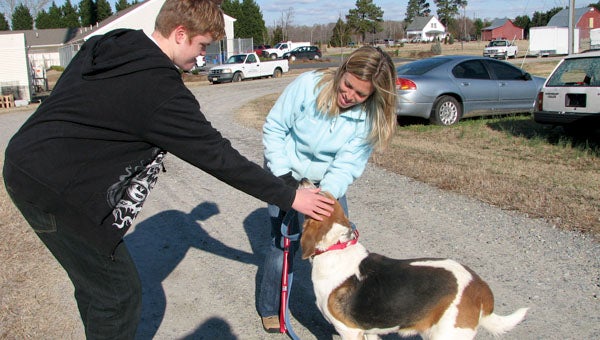Teens with autism learn job skills
Published 10:41 pm Friday, January 6, 2012

Shelter volunteers: Students at River’s Bend Academy are learning job skills and community involvement by volunteering at the Isle of Wight County animal shelter.
As he reaches to open the door of cage 29, 16-year-old Jeremiah Beasley moves slowly and quietly — he wouldn’t want to scare the orange cat curled up inside.
After pushing the metal gate out of the way, Jeremiah reaches in and gently picks up the cat.
Once the cat is outside of the cage, he sees the orange kitty has a large wound, still raw and red, on the back of its neck. But Jeremiah doesn’t cringe. He holds the cat gently in his arms — making sure to hold its hind legs up while minding the feline’s injury — and lovingly strokes his fur while whispering, “Poor kitty, poor kitty.”
In the outside world, some people might turn away from a cat with such a serious injury, but Jeremiah would never do that. He knows what it’s like to be different.
Jeremiah has autism, which limits his ability to function in everyday life. He’s a student at River’s Bend Academy, a private school on Godwin Boulevard for students with autism of all ages.
Since October, Jeremiah and four of his classmates have been visiting the Isle of Wight County Animal Shelter three times a week to volunteer and interact in a work environment.
Jeremiah struggles with simple tasks like introducing himself and following directions, but at the shelter, he is learning what it’s like to do a job and follow through with tasks.
Kim Burgess, a behavior analyst at River’s Bend, said between 13 and 16, it is important for students with autism to start learning about doing a job, but it’s challenging to find locations that will let the teens help.
Many of the teens that attend River’s Bend are far into the autism spectrum and have a lot of trouble functioning in everyday life.
“We have the hardest time with adolescents with autism to find jobs,” she said. “It’s hard to find places that are willing to open their doors to them.”
Burgess said she asked the Isle of Wight shelter if they would let the teens help after she heard they struggle to get volunteers.
The shelter agreed, and now, three times a week, Jeremiah along with Matthew Mahoney, 13; Stephen Culler, 15; Madison Johnson, 13; and Christopher Koonce, 15, visit for an hour or two in the morning to help with a variety of tasks.
“We’re getting to work on teaching them how to clean, walk the dogs and socialize the animals,” she said. “These are all jobs that people would do outside of school. It’s nice to be able to teach them to do this stuff.”
Through the process, Burgess said, she has seen great progress in all the students.
“We’ve seen different levels of independence skills with the kids,” she said. “When we first started, we had to guide them through every step, but now, they can remember to do the steps or just need a little prompting.”
In addition to learning work skills, Burgess said, the students are working on socialization, a particularly difficult challenge for people with autism.
“We’ve been able to work on the social aspect with the staff there,” she said.
Being in the noisy and busy shelter environment also helps some of the teens that have sensory issues, such as sound sensitivity, learn how to cope.
Aside from the real world benefits, Burgess said, one of her favorite things to see is how the students interact with the animals because both parties are non-discriminatory.
The animals don’t judge the teens for their condition, and the teens give the animals the same courtesy.
While they don’t mind the dogs, the cats are far more popular with the River’s Bend students, especially Jeremiah.
“He’s like a cat whisperer,” Burgess said. “He’d let all the cats out and play with them all at once if he could.”
From this point on, she said, she wants to continue to build on the lessons for the students by exploring the idea of working for a paycheck and honing job skills.
In fact, later this month, Jeremiah will learn how to utilize his talents for computer entry by running the shelter’s Petfinder page.
Whether the teens move on to get jobs or not, Burgess said, she hopes this experience can teach them skills to keep them busy after they leave school. Until then, the students can enjoy their work at the shelter, and the animals will enjoy the company.
“Even if this doesn’t translate into a paying job, they need something to do,” Burgess said. “It gives them something to make their life meaningful when they aren’t in school anymore.”






